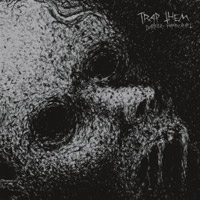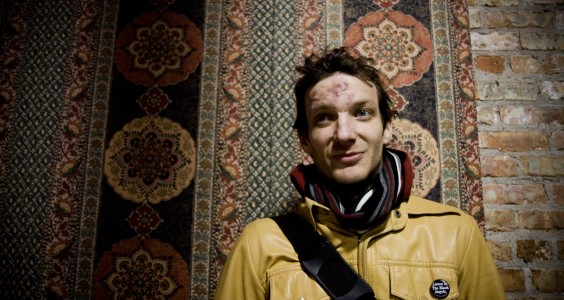Once a week, photo journalist Brian Leli has a brief behind-the-scenes encounter with a compelling band, musician, or artist and reports back on the experience.
 Trap Them: Darker Handcraft (Prosthetic, 3/15/11)
Trap Them: Darker Handcraft (Prosthetic, 3/15/11)
Trap Them: “The Facts”
[audio:https://alarm-magazine.com/wp-content/uploads/2011/01/Trap_Them_The_Facts.mp3|titles=Trap Them: “The Facts”]
Chicago, IL: Ryan McKenney is wearing a faded red sweatshirt with a faded black Swans patch on the back. He is sitting in the raised area that overlooks the stage at Reggie’s Rock Club. It is pitch black except for a few dim, red bulbs hanging nearby. The other members of his hardcore metal/punk band, Trap Them, are loading their equipment onto the stage — plugging this into that, turning this one up and that one down, this one left and that one right.
As with most bands, they have done this many times before. And they do it very quickly. But McKenney stays seated upstairs, leaning forward with his hood up, his face and his hands pumping slowly together. He is rubbing his head. Yes, it won’t be long now.
Soon, the tides will turn; the waves will come crashing down. McKenney’s sweatshirt will be just a rag strewn across the stage. His hands will climb the heads of those standing in the front of crowd. They will push up from their legs, to lift him higher. In 30 minutes, McKenney will be bleeding from his forehead, from his microphone. A small river of blood will stream down his face. And there will be peace in the valley.
“It’s just a half an hour a day to let yourself go,” McKenney says. Now, in the balcony, in a dilapidated red chair, he leans back and looks out at the spot where it just happened, now flooded in a harsh burst of unnatural light. “Unless you’re dead inside, you’re always looking for something,” he continues. “And that’s the thing — this is something for me.” He gleams with excitement when talking about his band’s upcoming album, Darker Handcraft. But mostly, he remains calm, polite, well spoken. He has, after all, only just a moment ago, just toppled the heavens. “I always feel better once I get off the stage,” he says. The skin on his forehead is pink and beginning to heal.
“I do three sets of lyrics,” McKenney explains. “But when we go in the studio, I do things sporadic, in the moment. And when we play live, I change them up again.” Emerging from within these lyrics: a running narrative, an entire cinema; setup, confrontation, resolution; a commentary on society. “Everything is involved with one town that I created — a working-class town,” he says. “I decided that this town all gave up in one day. And what I’m trying to do is tell the individual stories of everyone within it.”

McKenney notes how he divides their stories into days, their days into songs. (For example, day seven is “Digital Dogs with Analog Collars.”) Some have given up and grown very confused. (Day twenty-five is “Guignol Serene.”) Some have given up and grown very angry. (Day twenty-six is “Angles Anonymous in Transit.”) And others still have given up and simply grown dead inside. (Day two is “They Followed the Scent of Jihad all the Way to Thieves Paradise.”)
It is a lyrical technique influenced in part by a love of film and fiction. McKenney reads more than 100 books a year, he says. He worships Stephen King. He goes on about French new wave — Jean-Luc Godard, Jean-Pierre Melville, and so on. He tells how Italian film director Dario Argento helped to shape the way that he writes.
“One of the most important things that I ever heard,” McKenney says, “[was] when Dario Argento was interviewed about Suspiria, and how confusing the movie is. He basically said, ‘There is a linear story line. There is something there. But I only take about 15 minutes of the movie to tell the story. Because I consider the rest of it to be art. You can extend what you want to do. And sometimes things don’t make sense. But within the context of the movie, they make sense to me.’ And when I read that, I knew — that’s the way I want to do it. I don’t know if anybody’s ever going to get certain things; whether they’re ever going to get titles of records; whether they’re ever going to get what the lyrics mean. But as long as I feel it fits within the context of what I’m doing, then it works for me.”
“If there’s a phrase connected to art, it’s ‘I don’t get it,'” McKenney concludes. “And that’s the way it should be.”
It is at this point in the night that the human voice, a must in any conversation, becomes almost indecipherable. There is yet another show tonight and, therefore, another sound check. One will find that it becomes nearly impossible to hear anything over the continuous wail of a snare drum. And so, McKenney stands to leave. He turns left out of the front door at Reggie’s, and walks off in search of his band. Tonight they sleep in a hotel. Tomorrow they conquer Hollywood. And, as Thomas Dorsey said, “the skies will be clear and serene.”



